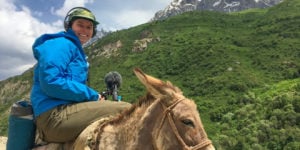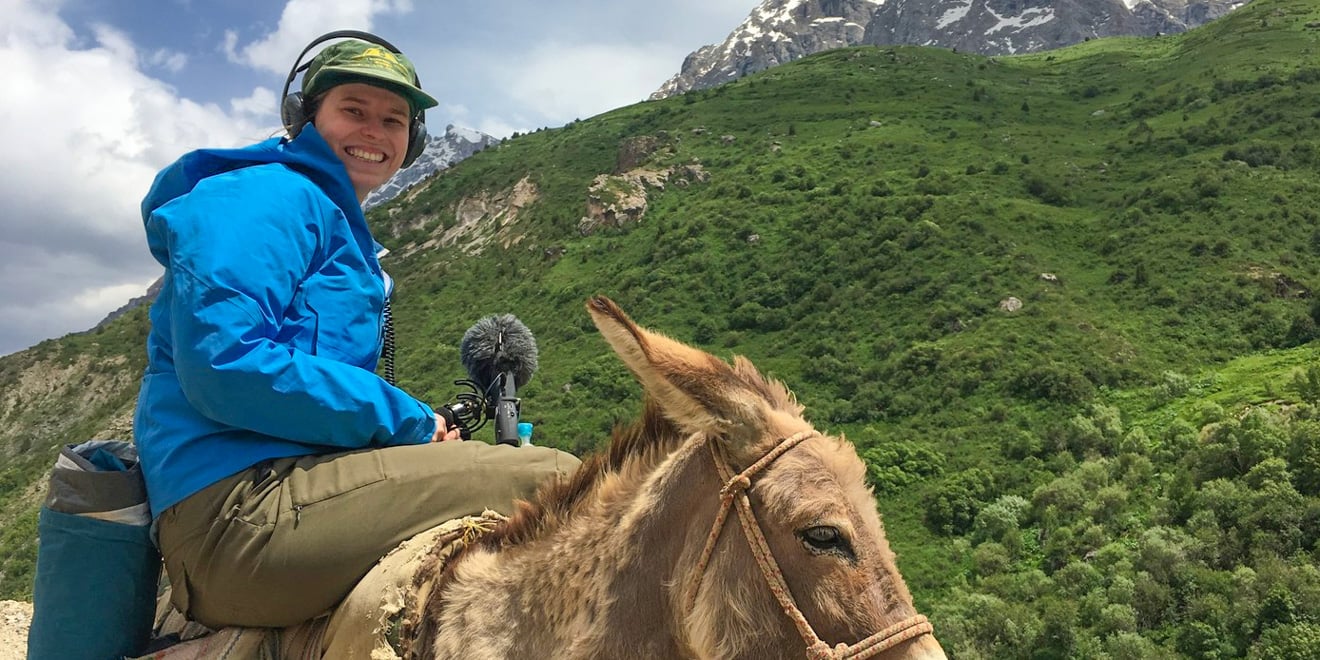In her BBC audio documentary on her six week-journey in Tajikistan, Nicole Bennett-Fite ’18 began with a tribute to the power of storytelling.
“Some time ago I heard a story that’s stuck in my mind,” Bennett-Fite said.

Titled “Tajikistan — Finding the Woman of Stone,” the documentary was the product of Bennett-Fite’s “Journey of a Lifetime” award, which funded her travels in Tajikistan during May and July this year and culminated in a radio broadcast on Oct. 2. Presented by BBC Radio 4 and the Royal Geographic Society, the yearly award offers 5,000 pounds for anyone “passionate about travel and excited to find new ways to tell original stories in sound” to travel and broadcast the story of the journey on radio.
As a student, Bennett-Fite has pursued her interest in narrative as a member of the Stanford Storytelling Project as well as a recipient of the Braden Storytelling Grant. But now Bennett-Fite beckons listeners to follow her far from Silicon Valley and into the heart of the Yagnob Valley in Tajikistan.
“About 800 years ago, when [Genghis Khan’s] armies were making their way across the ancient Persian world, a woman named Khoja Guliston retreated into the forest and turned herself into stone rather than submit to the rape of his encroaching army,” Bennett-Fite said in her documentary.
Since 2001, “Journey of a Lifetime” has sent recipients to India, Sierra Leone and Russia, but Bennett-Fite is the first U.S. citizen to receive the award. She said she found out about the opportunity while she was working at a radio station during a leave of absence from Stanford.
“I searched ‘radio travel grant’ into Google and what came up was the greatest travel grant ever,” Bennett-Fite said.
Her journey began in the Tajik capital of Dushanbe, where she searched for a translator while also dedicating time to understanding current social conditions for women in the country. She then travelled into the Yagnob Valley by donkey and by foot. According to Bennett-Fite, she had always wanted to visit the region, and she was left with a deep impression of the warmth and hospitality of the Tajik people.
Before earning the “Journey of a Lifetime” award, Bennett-Fite was actively involved in audio storytelling at Stanford. With funding from the Braden Storytelling Grant, she produced a six-minute piece interviewing the Chief Operating Officer of the American Cryonics Society.
Her mentor throughout the project was grant manager Jake Warga, a lecturer in the Program in Writing and Rhetoric and the managing editor of the Stanford Storytelling Project podcast “State of the Human”.
According to Warga, the Braden Storytelling Grant provides grantees like Bennett-Fite with “money and a microphone and mentorship.” Warga said that mentors are responsible for seeing the project through from the fieldwork phase to the making of the final product in SSP’s fall workshop, staying in constant contact with mentees throughout the process.
Bennett-Fite stayed in the Bay Area to interview Jim Yount and recount the past and present of cryonics in the U.S. for her Braden grant. Other recipients have also gone abroad for their projects.
“We are not prepping for journalists, we are prepping for storytellers and following the new wave for podcast production,” Warga said. “[It’s] not just news reporting but [about] looking at a deeper issue.”
Warga has taught courses such as TAPS 126: Sound Stories, in which students learned the basics of sound media storytelling with the help of Menlo Park police officers, who shared their experiences with the students.
Courses are just some of the many ways to get involved with storytelling on campus, and Bennett-Fite encourages students to be proactive.
“The best thing to do is just do it, especially when you are in school,” Bennett-Fite said, citing the free time students have to interview and the quality facilities that the University offers.
According to Warga, the Stanford Storytelling Project provides a range of opportunities for involvement, from open weekly meetings to Friday workshops to events with professionals working in sound media storytelling.
The Stanford Storytelling Project also partners with KZSU Stanford 90.1 FM, the campus radio station that offers training opportunities to Stanford students such as sound editing and DJ classes. Students also have the option to contribute small productions in the weekly KZSU News Hour or even host their own show after a quarter of training.
Bennett-Fite said she thinks that radio journalism is “a great service to the world” and a way to spread information and spark social and political change in a society, but to her, the value of a good story is more fundamental than that.
“Oral storytelling is our oldest tradition,” Bennett-Fite said.
Contact Andrea Villa at acvilla ‘at’ stanford.edu.
